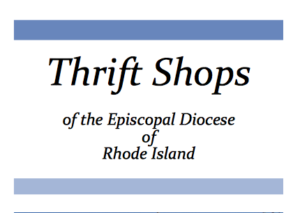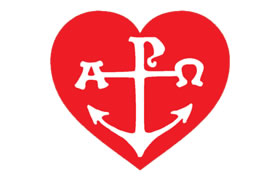Parish Champions, here are links to the materials in the event you need more for your campaign.
Thrift Shop Ministry
 Several Episcopal churches in the diocese have thrift shops. While there are different purposes and audiences for these shops, they all have a focus on ministry. Some sell higher priced goods with an eye towards raising money — most of which is given to outreach projects. Others sell inexpensive good and serve people who otherwise can not afford to buy new items. And several of our thrift shops recognize that fellowship is an important part of their ministry.
Several Episcopal churches in the diocese have thrift shops. While there are different purposes and audiences for these shops, they all have a focus on ministry. Some sell higher priced goods with an eye towards raising money — most of which is given to outreach projects. Others sell inexpensive good and serve people who otherwise can not afford to buy new items. And several of our thrift shops recognize that fellowship is an important part of their ministry.
- St. Mary’s, East Providence, for example, relocated their thrift shop and deliberately set up an area where people can sit and chat because they found that several older adults came regularly, as much for the company as anything else.
- Other thrift shops “pass along” items that have been in stock for awhile. San Jorge, in Central Falls and St. James, in Woonsocket are two churches that value receiving these pass-along contributions and they probably serve the poorest populations. San Jorge doesn’t have a thrift shop, but if you coordinate with them, they host a yard sale with the good you need to rotate out of your shop. St. James has a thrift shop that works in close collaboration with an agency that screens and refers clients to them.
How might your thrift shop enhance it’s ministry?
Visit some of the other thrift stores in the state — they will be glad to share their experience or help you start a store. St. Martin’s team has assembled a brochure that lists all of the Episcopal thrift stores. DOWNLOAD Thrift Shop Brochure to print copies to distribute in your store and/or church.
Capital Campaigns
 A sizable campaign will probably need a consultant. Confer with the Diocese or other churches to locate consultants.
A sizable campaign will probably need a consultant. Confer with the Diocese or other churches to locate consultants.
- Episcopal Church Foundation Vital Practices has guidance and provides consultant
- Webinars and articles are also available from Vital Practices
- The Episcopal Church Building Fund provides consulting services and loans.
Third-Party Fundraisers
 Third-party fundraising is a way you can raise funds for a cause with very little work on your part. It is best suited for small congregations or those who have a predominately older membership unable to do the cooking, serving, selling and schlepping they used to do in their younger days, or congregations with very busy younger adults – especially those with families who are juggling multiple schedules. Third-party fundraising means letting someone else do the work while you get a portion of the funds raised.
Third-party fundraising is a way you can raise funds for a cause with very little work on your part. It is best suited for small congregations or those who have a predominately older membership unable to do the cooking, serving, selling and schlepping they used to do in their younger days, or congregations with very busy younger adults – especially those with families who are juggling multiple schedules. Third-party fundraising means letting someone else do the work while you get a portion of the funds raised.
Download Third-Party Fundraisers for ideas, especially for churches with few people able to do labor-intensive fundraisers.
Download Fundraising Strategies for a few other ideas
Guide to Good Yard Sales
 Yard Sales, whether on the church lawn or parish hall, can accomplish several things at the same time. They are, of course, supposed to raise money for the church or for a special cause, often outreach projects. In many cases, churches also hope to provide low-income people an opportunity to buy things at an affordable price. But there is a third reason to hold a yard sale that most churches overlook – it’s an evangelism opportunity. There are a few things you can do to maximize what you accomplish. And you can apply these ideas to a Christmas Fair, Thrift Shops and other sale events.
Yard Sales, whether on the church lawn or parish hall, can accomplish several things at the same time. They are, of course, supposed to raise money for the church or for a special cause, often outreach projects. In many cases, churches also hope to provide low-income people an opportunity to buy things at an affordable price. But there is a third reason to hold a yard sale that most churches overlook – it’s an evangelism opportunity. There are a few things you can do to maximize what you accomplish. And you can apply these ideas to a Christmas Fair, Thrift Shops and other sale events.
Download Guide to Good Yard Sales an old but faithful way to raise money, especially if you keep it simple!
Donut Fundraiser
 A few years ago, it was cupcakes with little shops popping up everywhere. Today, cupcakes are passé and the new trend is donuts. Gourmet donuts at, frankly, ridiculous prices! But people will literally stand in line for a half hour for the privilege of buying a donut for $2.75-$3.25 each. PVDonuts on Ives Street in Providence is a good example of this phenomenon as is Knead Donuts on Custom House St. in Providence. So this is a good time to take advantage of this trend and do a Donut Fundraiser.
A few years ago, it was cupcakes with little shops popping up everywhere. Today, cupcakes are passé and the new trend is donuts. Gourmet donuts at, frankly, ridiculous prices! But people will literally stand in line for a half hour for the privilege of buying a donut for $2.75-$3.25 each. PVDonuts on Ives Street in Providence is a good example of this phenomenon as is Knead Donuts on Custom House St. in Providence. So this is a good time to take advantage of this trend and do a Donut Fundraiser.
Download Donut Fundraiser for more ideas than you probably want or need! Creative ideas for this trendy fundraiser from Canon Grenz.
Sustainable Church
The rising costs of staff combined with declining memberships and, in many cases, buildings requiring increased capital investment are impacting all sizes of churches today. Most small churches faced these issues years ago, but now even our larger churches are struggling to make ends meet. More and more churches are beginning to look at how they can become a “sustainable church.” In other words, how can we make the income and costs balance over time in a way that frees us to do ministry instead of being held captive by financial concerns?
Sustainable Church, an article to begin the process of re-thinking how we fund churches.
Lease and License Agreements
 Leases and License Agreements are legal agreements between a church and an outside group that uses all or part of a church’s facility for a determined period of time. Leases are used when you are giving another group exclusive use of a building or portion of a building for an extended period of time. A license is a revocable privilege to perform an act or a series of acts on the property of another, like the use of a parish hall for a wedding reception or regular AA meetings. It can also be used if you are sharing space with a group (e.g., a pre-school sharing rooms with the Sunday School). Remember that a lease gives the user tenant rights and is not easily revoked while a license sets parameters for a user but can be revoked quite easily. So consider which makes sense in your situation — and feel free to call Canon Dena if you want to consult with someone.
Leases and License Agreements are legal agreements between a church and an outside group that uses all or part of a church’s facility for a determined period of time. Leases are used when you are giving another group exclusive use of a building or portion of a building for an extended period of time. A license is a revocable privilege to perform an act or a series of acts on the property of another, like the use of a parish hall for a wedding reception or regular AA meetings. It can also be used if you are sharing space with a group (e.g., a pre-school sharing rooms with the Sunday School). Remember that a lease gives the user tenant rights and is not easily revoked while a license sets parameters for a user but can be revoked quite easily. So consider which makes sense in your situation — and feel free to call Canon Dena if you want to consult with someone.
A license template is available here. It is a Word document; look for it in your download folder if it does not open automatically.
How much should we charge? If you are looking at a multi-year lease, it is best to have a realtor provide a fair market value assessment so you can change a reasonable amount. Checking the websites or calling neighboring churches, other faith communities and other places the offer comparable space will give you an idea of what the market is for space rental in your community.
If you want to support a group that is doing work consistent with your mission, it is still wise to set the fair market value as the “rent” and then grant the group the amount you wish to provide as a “discount.” That means that the renting group clearly understands the value of space they are using and the congregation understands the value of what they are giving the group. It also allows the group to do fundraising since they can show the true cost to potential donors. This is important if you anticipate that you will need to raise the rent over time.
Help Raise Funds for Episcopal Charities
Episcopal Charities was founded in 1952 with the desire and sense of responsibility to help those in need, and this tradition continues today.
“In acknowledgement of the Gospel Imperative to feed, clothe, heal and visit, the Episcopal Charities Fund of Rhode Island assists ministries of the Diocese and charities of the wider Rhode Island community by raising and helping to provide funds, and in so doing, bringing hope, comfort and healing to Rhode Islanders in need.”
Funds from Episcopal Charities will be used to assist battered women and abused children seeking a safe haven, to provide thousands with food, heat, shelter, healthcare and other basic needs, and to give the elderly and terminally ill c omfort and a sense of dignity through their last days. Through Episcopal Charities, those who suffer from drug addiction receive help toward recovery. Immigrants will be able to read and speak English. Children find the unconditional love of Jesus and learn leadership skills at summer camps. In 2015, grants were distributed to 69 agencies and programs throughout Rhode Island.
omfort and a sense of dignity through their last days. Through Episcopal Charities, those who suffer from drug addiction receive help toward recovery. Immigrants will be able to read and speak English. Children find the unconditional love of Jesus and learn leadership skills at summer camps. In 2015, grants were distributed to 69 agencies and programs throughout Rhode Island.
Selection Process:
Each year the Grant Review Committee visits agencies and reviews all agency funding requests for conformance with its mission statement. Requests are discouraged that can obtain funding elsewhere or are heavily funded by government sources. Episcopal Charities does not grant funds to pay for existing debts, capital projects, advocacy, or research.
Our Donors:
The Episcopal Charities Annual Campaign raises funds for grant distributions through the generous spirit and caring of individuals in the Episcopal churches of the Diocese, as well as support from members of the Rhode Island corporate community. You can help raise funds by organizing a campaign in your church, soliciting funds from people you know, hosting a fundraiser or even just donating!
Donate
Your gift will do so much for so many.
Giving to the Episcopal Charities Fund is the best way to help those in need.
100% of your donation is granted out to agencies and diocesan entities to address the critical issues of our time. Our administrative costs are covered by a special endowment.
We do the research – so you know your money is going to worthwhile causes and well run agencies. We follow up to ensure that grants are being used effectively and as intended, and we support many small agencies where our grants have a significant impact on their ability to offer specific services and programs.
Make Your Contribution Online Today!
Or donate by check with our mail-in form. (PDF)
Give the Gift of a Donation to Episcopal Charities!
Whether for birthdays, weddings, anniversaries or just to say, “I love you,” give someone the gift of helping others. Print out a free honor card to share the gift of Episcopal Charities.
If you have any questions please contact us at 401-274-4500 x234 or by email at charities@episcopalri.org

Harry Potter and the church pledge drive
Good idea:
![Harry Potter and the church pledge drive [in HarryPotter font]](https://www.episcopalri.org/wp-content/uploads/2017/08/Harry-Potter-headline.png)
by Dave Seifert
Harry Potter is coming to church in Cumberland.
The popular books and movies, celebrating their 20th anniversary this year, will be used as the theme for this year’s pledge drive at Emmanuel Church. The special campaign will feature celebration, competition and creativity.
Here are five things to know about what Emmanuel is doing.
1. Separating the focus on pledge drive and stewardship. Emmanuel has stopped using the term “stewardship” in direct connection with financial pledges. “We’re having a ministry fair in early September where members can tell us how they will spend their time and talents,” explained the Rev. Joan Testin, rector. “The pledge campaign is about funds to operate the church and how we as Christians think about and decide how to spend our money.
“We separate out ‘treasure’ from ‘time and talent’ because it gives all of us time to consider how we use our discretionary money,” she added. “When we give appropriately for the work of the church and to help serve others, we are free to enjoy the rest of what we have been able to earn and accumulate through God’s good gifts to us.”
2. Having fun and celebrating. The campaign will begin with a celebratory dinner to announce the theme and prizes. Parishioners will be divided into four groups, to represent the four houses at the Hogwarts School of the books and movies. Testin and a church member who normally tracks pledges are creating the teams to have a balance of current pledgers and nonpledgers.
“We’re planning to serve some of the foods talked about in the books — such as treacle tarts and knickerbocker glories (traditional British desserts),” she noted. “One of our members also is researching a way for us to play Quidditch (magical competitive sport involving flying contestants).”
3. Building involvement/engagement. The campaign will use competition to build involvement. The team with the most pledging members will win “the house cup” (given at Hogwarts at the end of the school year to the house with the most points), which will be awarded at a mid-November celebration.
4. Using visual stimulation. As the campaign goes on, progress will be tracked using big charts on the back of the wall in Emmanuel’s worship space. Big sequins will be used to add jewels to a cup each time someone pledges.

5. Continuing to emphasize the “why” of pledging vs. giving. Even with all the creativity, though, the campaign isn’t without its traditional moments. “We’re planning our usual Sunday morning conversations about why we pledge vs. why we give,” Testin said. “But we’re building everything around the Potter theme. We’ll see how it goes!”
Do you know of other “good ideas” happening at Rhode Island Episcopal churches? Other churches might pick up those ideas and apply them. Send your “good idea stories” to pressroom@episcopalri.org.
